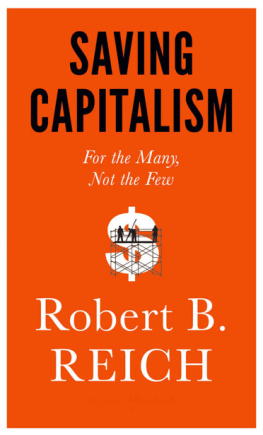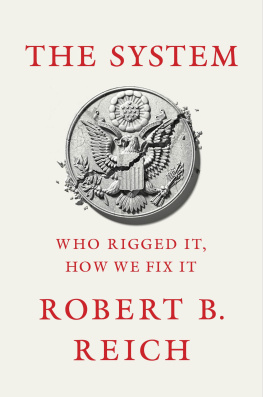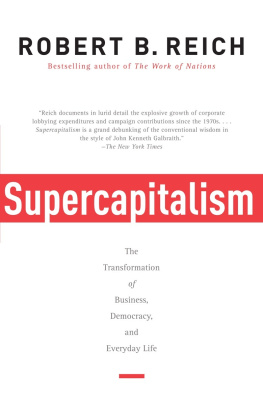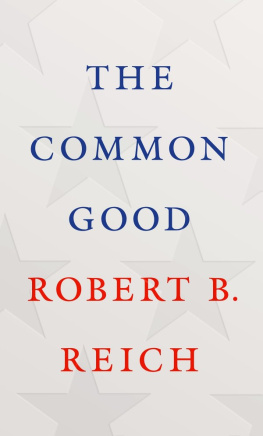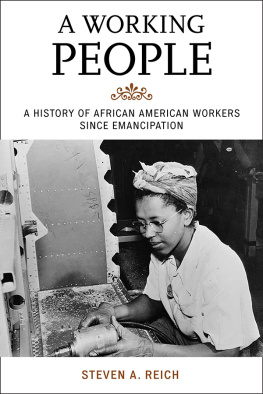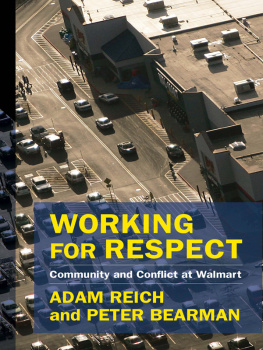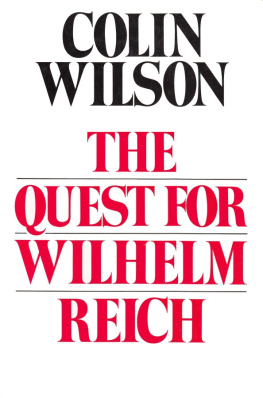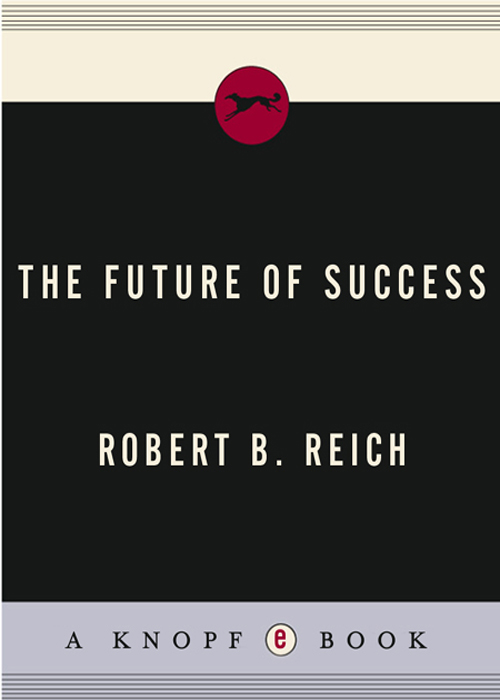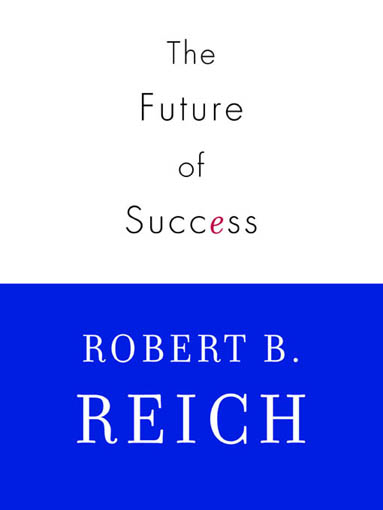Robert B. Reich
CONTENTS
CHAPTER TEN
The Community as Commodity
UNCLE BILLY [emotionally, at breaking point]: Mary did it, George! Mary did it! She told a few people you were in trouble and they scattered all over town collecting money. They didnt ask any questionsjust said: If George is in troublecount on me. You never saw anything like it.
Its a Wonderful Life, screenplay, 1946
T HE FINAL CONSEQUENCE of the emerging economy for our personal lives concerns the communities we inhabit. Communities used to pick up where families left off. Home schooling gave way to the local public school; the very sick moved from home to the local hospital; libraries and playgrounds provided access to expensive facilities few families could afford on their own. Think of a community, and youre likely to picture a place where people look after one anothera traditional neighborhood, church, voluntary association, New England town meeting, frontier barn-raising, quilting bee, volunteer fire department, charity supper. The last scene in Frank Capras 1946 movie Its a Wonderful Life typifies the American ideal: Just as George (Jimmy Stewart) is about to give up in despair, he finds he can count on his neighbors generosity and goodness, as they have always counted on his. Theyre bound together in common cause and friendship.
Contrast this imagery to a more recently heard lament: Americans lack community. Were no longer joiners. We dont know the people next door. We bowl alone. Since most of us are working harder and selling ourselves with ever-greater gusto, no one should be surprised if we have less energy to spend with our neighbors.
But the view that were no longer joining with others is not quite correct, and it fails to account for the most important aspect of whats happening. Were still joining togetherfor child care, elder care, schools, health care, insurance, health clubs, investment clubs, buying clubs, recreational facilities, private security guards, and everything else thats too expensive to purchase alone. But were not joining as participants; were joining as consumers. Were pooling our financial resources to get the best deal.
The same advances in communication, transportation, and information technologies that are giving us wider choices of products and investments are giving us wider choices of whom to join and for what purpose. And as with other facets of our new lives, we can abandon the community we choose almost instantly and switch to another in pursuit of an even better deal. Like personal attention, communities are becoming marketable goods. We get what we pay for, and we pay not a penny more than necessary for what we get.
NEW GROUPS
Through most of human history, community members didnt have much choice about whom they joined. They were born into their communities and usually died in the same ones. Some notably broke with theirs or were banished, but these partings were rare or traumatic. Even well into the industrial age, most people still congregated within extended families and clans that gave definition to city neighborhoods. Members of these communities stayed put for at least a generation or two.
These communities provided their members some security and care. Yet they often did so at the price of boredom and stifled opportunity. One of historys crowning achievements has been to give people a choice of community. An unprecedented share of Americans (and citizens of other modern nations) now enjoy the freedom to escape the communities they were born into. They can choose whom they join with, and then switch to another group if they wishanother residential community, spa, health plan, child-care center. They can abandon their cyber-communities with a click. As choice replaces random fate, surely community life will be richer, more harmonious, and happier. How could it be otherwise?
For one thing, membership in the older communities extended to many facets of a members life. There were many different arrangements, of course, but mutual obligations and benefits tended to come in a big bundle: production, defense, care, nourishment, parenting, entertainment, and spirituality. As a participant, you contributed no less to the bundle than was expected of you, and extracted no more than you were expected to take. Clan members produced for the clan and took care of one anothers children, sick, or elderly.
By contrast, the new communities offer highly specific benefits. You pick a community for exactly what you want from it. As with other aspects of your new life, you shop for the best community you can afford. Because exit is so easy and the benefits are so targeted, these new communities dont require nearly as much commitment as the old did, nor do they offer the same security to members who might need to depend on one another in a pinch. Sure, you develop friends in a child-care group, but you dont have to reveal as much about yourself along the way, and you can end the friendship instantly, as can they.
Heres the real catch. Given the range of choice and ease of switching, were sorting ourselves into communities of people with roughly the same incomes, the same abilities, the same risks, and the same needs. Where we live has more to do with how much we earn than ever before. Its Vail and Greenwich versus the communities who attend to thembut on a much larger scale. People who are most buffeted by the new economywhose incomes have eroded the most, whose earnings are the most precariousare ending up together in the same poor communities. Their schools are among the worst. They have less medical attention. Their insurance is more costly. Even when they pool what they can afford, the parents of toddlers still cant raise enough for good-quality day care. This sorting process started years ago, but its become far more efficient, just when the people who are being sorted away into neglected communities need help the most.
THE SORTING MECHANISM
To understand what is taking place, you have to understand the sorting mechanism. All other things being equal, someone who buys into a community wants the highest return on his or her investmentthe best value, best service, most enjoyable and stimulating peers, largest amount of prestige their money will buy. Those already in likewise want the highest return on every new memberpeople who will contribute as much as if not more than they, and who make minimum demands on the common pool of resources. Unless your motive is charitable, theres no sense joining a community composed of a lot of people who are more costly and needy than you, because youll end up subsidizing them. And its irrational for a group to go out of its way to attract members who will be a drain on it, or to provide benefits that will likely attract such people.
When a friend recently landed a job at the University of California at Los Angeles and his wife got a job in a financial firm in downtown Los Angeles, the two of them toured many different communities within a fifty-minute commute for both in order to find a good place to live. After they narrowed their pick of community, they examined a variety of condominiums and cooperatives. They finally settled on the best deal they could affordwithin a condominium complex possessing its own security guards, maintenance crew, modest recreation facility, and even broadband Internet connection, in a neighborhood that was safe and attractive and contained a good elementary school for their daughter. In making their decision, they naturally considered the price of the condominium and the monthly fee that went along with it, as well as local taxes. They didnt consciously seek to live in a community containing few poor people whose children would need extra instruction in school and whose overall family needs would require more social services and hence higher local taxes to pay for them. And they didnt intentionally choose a condominium complex whose price would screen out poorer people with larger families that might use up more of the common amenities. They simply tried to find the best deal for their money. They had a lot of information and a wide array of choices (townships with different tax bases, private residential communities with different monthly fees).


